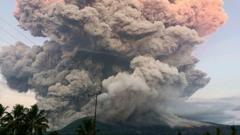The conflict between Israel and Iran has reached new heights as President Trump signals potential U.S. military involvement alongside Israel’s ongoing strikes. Civilians in both nations face increasing danger amidst rising casualties, while Iran restricts its internet access to manage domestic panic.**
Tensions Escalate: Trump Demands Iran's Surrender Amid Intensified Israel-Iran Conflict**

Tensions Escalate: Trump Demands Iran's Surrender Amid Intensified Israel-Iran Conflict**
In the face of escalating military actions, President Trump calls for "unconditional surrender" from Iran, as Israel intensifies its air campaign targeting Iranian nuclear and military installations.**
The escalating military conflict between Israel and Iran has drawn heightened reactions from the U.S., particularly with President Trump’s recent statements demanding Iran's "unconditional surrender.” Trump has indicated a willingness to support Israel's air campaign against Iranian targets, amid reports that the U.S. may be considering an active role in the confrontation, with military advisors and intelligence gathering intensifying.
As Israel continues its strikes aimed at crippling Iran's nuclear infrastructure, the situation in Iran remains dire. Many civilians are fleeing major cities like Tehran, trying to escape the bombings that have already resulted in a tragic death toll of over 200 Iranians and significant injuries. The Iranian regime is facing a crisis of confidence, while reports posit that people have become increasingly paranoid over their safety in light of possible future attacks. Mourners have gathered for those lost, reflecting on the deteriorating condition of Iranian civil society in the wake of aerial assaults that target not only military sites but also additional state-related infrastructures.
Amid the chaos, Iranian citizens have also experienced disruptions in basic services, including prolonged fuel shortages as panic drives heavy traffic congestion on escape routes. As families grapple with fear, uncertainty, and sporadic communications due to restricted internet access, citizens express feelings of despair and disbelief.
In parallel, Israel, bolstered by its own updates on military achievements, has initiated an aggressive air campaign targeted at key Iranian military installations, with Israeli Prime Minister Benjamin Netanyahu calling for the U.S. to provide support that may include advanced munitions capable of targeting deep underground sites. The Israeli military chief has emphasized the necessity of undermining Iran's military capabilities to secure Israel’s interests in the region.
The international community watches with trepidation as both sides appear entrenched, with calls for de-escalation clashing with aggressive tactics from both Israel and Iran. Lawmakers in the U.S. reflecting on the risks of broader entanglement in the conflict are pushing forward legislative measures aimed at curbing President Trump’s military authority over involvement with Iran.
The unfolding dynamics raise significant questions about the future of U.S.-Iran relations and the regional balance of power, even as humanitarian crises intensify within both Lebanon and Palestinian territories where violence has also surged amidst this backdrop.
In summary, the current situation remains volatile, with the potential for further military escalation looming as both sides prepare for an extended confrontation. The specter of war hangs heavily, impacting not only political landscapes but the daily lives of ordinary citizens caught in the crossfire.
As Israel continues its strikes aimed at crippling Iran's nuclear infrastructure, the situation in Iran remains dire. Many civilians are fleeing major cities like Tehran, trying to escape the bombings that have already resulted in a tragic death toll of over 200 Iranians and significant injuries. The Iranian regime is facing a crisis of confidence, while reports posit that people have become increasingly paranoid over their safety in light of possible future attacks. Mourners have gathered for those lost, reflecting on the deteriorating condition of Iranian civil society in the wake of aerial assaults that target not only military sites but also additional state-related infrastructures.
Amid the chaos, Iranian citizens have also experienced disruptions in basic services, including prolonged fuel shortages as panic drives heavy traffic congestion on escape routes. As families grapple with fear, uncertainty, and sporadic communications due to restricted internet access, citizens express feelings of despair and disbelief.
In parallel, Israel, bolstered by its own updates on military achievements, has initiated an aggressive air campaign targeted at key Iranian military installations, with Israeli Prime Minister Benjamin Netanyahu calling for the U.S. to provide support that may include advanced munitions capable of targeting deep underground sites. The Israeli military chief has emphasized the necessity of undermining Iran's military capabilities to secure Israel’s interests in the region.
The international community watches with trepidation as both sides appear entrenched, with calls for de-escalation clashing with aggressive tactics from both Israel and Iran. Lawmakers in the U.S. reflecting on the risks of broader entanglement in the conflict are pushing forward legislative measures aimed at curbing President Trump’s military authority over involvement with Iran.
The unfolding dynamics raise significant questions about the future of U.S.-Iran relations and the regional balance of power, even as humanitarian crises intensify within both Lebanon and Palestinian territories where violence has also surged amidst this backdrop.
In summary, the current situation remains volatile, with the potential for further military escalation looming as both sides prepare for an extended confrontation. The specter of war hangs heavily, impacting not only political landscapes but the daily lives of ordinary citizens caught in the crossfire.























